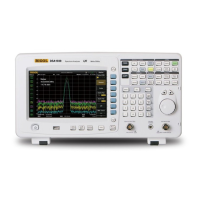RIGOL
User’s Guide for DSA1000 Series III
Avoid Circuit or Wire Exposure.
Do not touch exposed junctions and components when the unit is powered.
Do Not Operate With Suspected Failures.
If you suspect damage occurs to the instrument, have it inspected by qualified service
personnel before further operations. Any maintenance, adjustment or replacement
especially to circuits or accessories must be performed by RIGOL authorized
personnel.
Keep Well Ventilated.
Inadequate ventilation may cause an increase of temperature or damage to the device.
So please keep well ventilated and inspect the intake and fan regularly.
Do Not Operate in Wet Conditions.
In order to avoid short circuiting to the interior of the device or electric shock, please
do not operate in a humid environment.
Do Not Operate in an Explosive Atmosphere.
In order to avoid damages to the device or personal injuries, it is important to operate
the device away from an explosive atmosphere.
Keep Product Surfaces Clean and Dry.
To avoid the influence of dust and/or moisture in air, please keep the surface of device
clean and dry.
Electrostatic Prevention.
Operate in an electrostatic discharge protective area environment to avoid damages
induced by static discharges. Always ground both the internal and external conductors
of the cable to release static before connecting.
Protect the Input Terminals of Instrument.
Do not bend or hit the input terminals and the connected devices, (such as filter,
attenuator, etc.) as such stress may cause damages to devices and the instrument. Do
not mix the use of 50Ω and 75Ω connectors and/or cables.
Do Not Overload the Input.
To avoid damaging the instrument, the signals at input terminal must be less than 50V
DC voltage components and 30 dBm (1 W) AC (RF) components (the frequency range

